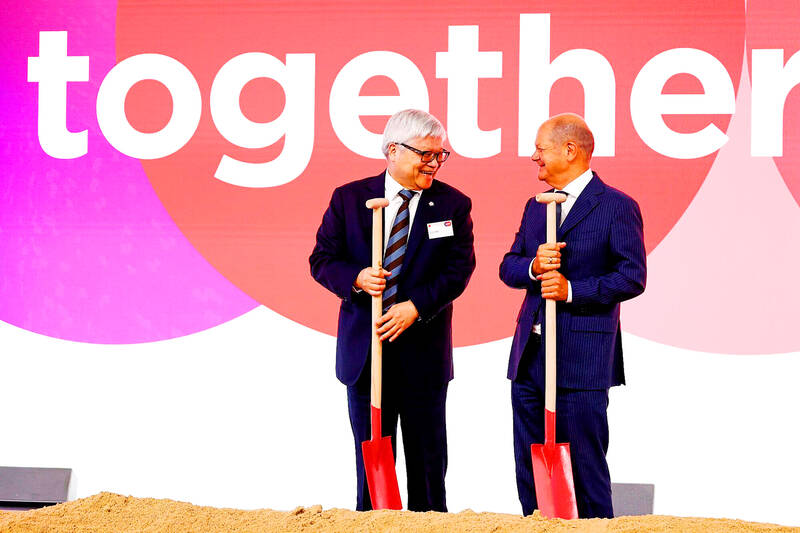The German government is preparing billions of euros of new investments into the nation’s semiconductor industry, two months after Intel Corp shelved plans to build a 30 billion euro (US$31.6 billion) chip factory in Magdeburg, Germany.
The new funds would be provided to chip companies to develop “modern production capacities that significantly exceed the current state of the art,” Annika Einhorn, a spokesperson from the German Ministry for Economic Affairs and Climate Action, said in a statement on Thursday.
The subsidies are expected to total about 2 billion euros, said two people who attended an official event about the funding plans this week and speaking on condition of anonymity.

Photo: Bloomberg
The sum would be in the “low single-digit billion euro range,” a spokesperson for the ministry said in response to a query from Bloomberg News, declining to be more specific.
The ministry had published a call for chips companies to apply for new subsidies earlier this month, although the final figures are still in flux. A new government is set to be elected in February and would likely plan its own budget, leaving uncertainty for the chip companies now applying for the subsidies.
Governments around the world have been investing public funds in the chip industry as part of an effort to localize production of components that control everything from cutting-edge artificial intelligence to everyday gadgets. The push comes after COVID-19 pandemic era supply disruptions and as rising tensions between the US and China over Taiwan could interfere with a key source of the essential technology.
The European Chips Act, passed last year, aims to strengthen the bloc’s semiconductor ecosystem and double its market share to 20 percent of global production capacity by 2030.
Germany’s chip sector has faced two major setbacks. Intel’s 30 billion euro chip factory in Magedeburg was on track to be the biggest project supported under the EU’s Chips Act with 10 billion euros in subsidies, but the troubled US company postponed its plans in September.
Wolfspeed Inc. and ZF Friedrichshafen AG also withdrew a planned chips venture in western Germany.
The first rounds of German subsidies under the EU’s Chips Act were granted to Intel and a joint venture between Infineon and Taiwan Semiconductor Manufacturing Co (TSMC, 台積電) in Dresden, Germany.
Germany’s economic ministry wants to use the newly proposed funds to subsidize 10 to 15 projects across a range of fields, including the production of raw wafers and the assembly of microchips.
“The funded projects should contribute to a strong and sustainable microelectronics ecosystem in Germany and Europe,” Einhorn said.

The US dollar was trading at NT$29.7 at 10am today on the Taipei Foreign Exchange, as the New Taiwan dollar gained NT$1.364 from the previous close last week. The NT dollar continued to rise today, after surging 3.07 percent on Friday. After opening at NT$30.91, the NT dollar gained more than NT$1 in just 15 minutes, briefly passing the NT$30 mark. Before the US Department of the Treasury's semi-annual currency report came out, expectations that the NT dollar would keep rising were already building. The NT dollar on Friday closed at NT$31.064, up by NT$0.953 — a 3.07 percent single-day gain. Today,

‘SHORT TERM’: The local currency would likely remain strong in the near term, driven by anticipated US trade pressure, capital inflows and expectations of a US Fed rate cut The US dollar is expected to fall below NT$30 in the near term, as traders anticipate increased pressure from Washington for Taiwan to allow the New Taiwan dollar to appreciate, Cathay United Bank (國泰世華銀行) chief economist Lin Chi-chao (林啟超) said. Following a sharp drop in the greenback against the NT dollar on Friday, Lin told the Central News Agency that the local currency is likely to remain strong in the short term, driven in part by market psychology surrounding anticipated US policy pressure. On Friday, the US dollar fell NT$0.953, or 3.07 percent, closing at NT$31.064 — its lowest level since Jan.

The New Taiwan dollar and Taiwanese stocks surged on signs that trade tensions between the world’s top two economies might start easing and as US tech earnings boosted the outlook of the nation’s semiconductor exports. The NT dollar strengthened as much as 3.8 percent versus the US dollar to 30.815, the biggest intraday gain since January 2011, closing at NT$31.064. The benchmark TAIEX jumped 2.73 percent to outperform the region’s equity gauges. Outlook for global trade improved after China said it is assessing possible trade talks with the US, providing a boost for the nation’s currency and shares. As the NT dollar

The Financial Supervisory Commission (FSC) yesterday met with some of the nation’s largest insurance companies as a skyrocketing New Taiwan dollar piles pressure on their hundreds of billions of dollars in US bond investments. The commission has asked some life insurance firms, among the biggest Asian holders of US debt, to discuss how the rapidly strengthening NT dollar has impacted their operations, people familiar with the matter said. The meeting took place as the NT dollar jumped as much as 5 percent yesterday, its biggest intraday gain in more than three decades. The local currency surged as exporters rushed to